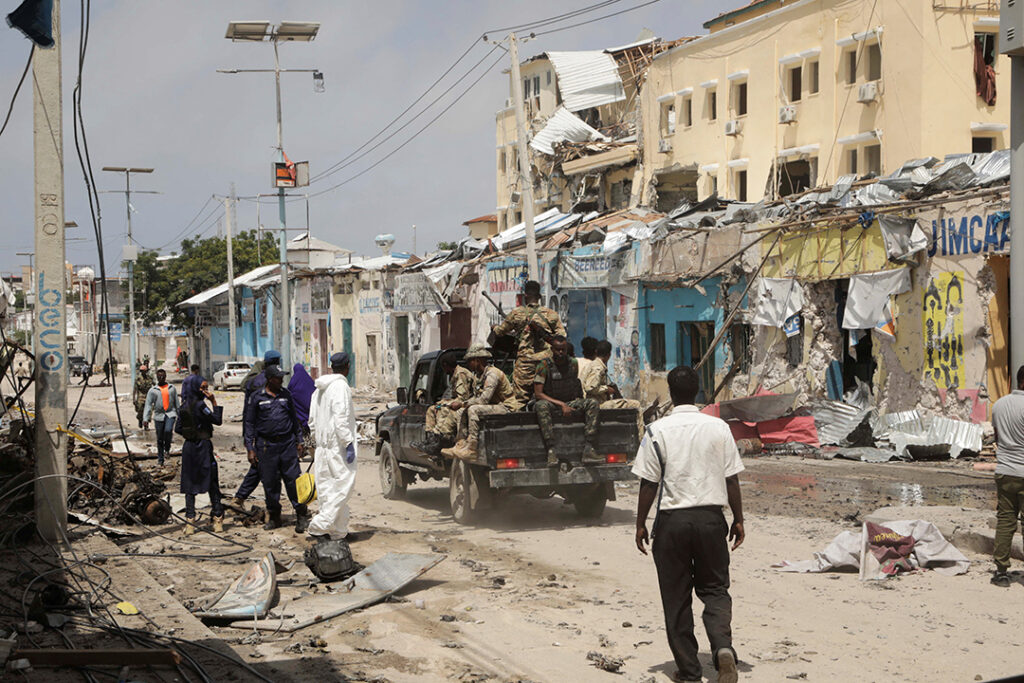ADF STAFF
Somali President Hassan Sheikh Mohamud has vowed to wage “total war” against al-Shabaab, but the extremist group continues to launch brazen attacks targeting civilians and security forces.
Between May 27 and June 23, the Armed Conflict Location & Event Data Project (ACLED) recorded more than 200 attacks or instances of violence linked to the terrorist group in Somalia. More than 700 people died in the attacks.
Most of the violence was in the Lower Shabelle region, which surrounds Mogadishu, where al-Shabaab launched dozens of attacks against African Union Transition Mission in Somalia (ATMIS) troops.
ATMIS has until December 2024 to hand over full security responsibilities to Somali forces and is steadily withdrawing troops from the country. The mission withdrew 2,000 troops by the end of June — 400 each from Burundi, Ethiopia, Djibouti, Kenya and Uganda — and is expected to withdraw 3,000 more by the end of September.
Mohamud Sayid Aden, vice president of Somalia’s Jubaland State, said that it will be “difficult” for Somali forces to secure areas vacated by ATMIS troops. According to ACLED, al-Shabaab attacks against ATMIS troops have risen steadily since late March.
“There is going to be a danger from there,” Aden told Voice of America Somalia. “The enemy is going to get [an] advantage. The civilians who relied on the Somali and ATMIS forces will face revenge.”
Aden called for the drawdown to be “paused and reviewed.”
In late May, al-Shabaab attacked an ATMIS base housing Ugandan Soldiers in Bulamarer, 130 kilometers southwest of Mogadishu. Ugandan President Yoweri Museveni said 54 Ugandan troops were killed in the attack.
In early July, al-Shabaab raided an ATMIS Forward Operating Base in Gherille, Jubaland State. The base housed Kenya Defence Forces troops until it was handed over to Somali forces in June. Somali National Army troops thwarted the raid after a fierce gunfight, according to Somali news website garoweonline.com.
Somali forces have had success against the group. The first offensive against al-Shabaab under Mohamud focused in the Middle Shabelle region. During that effort, which ran from August 2022 to January 2023, Somali Soldiers liberated 70 communities including Rage-El, a village that was under al-Shabaab control for 13 years.
The offensive reclaimed about one-third of the territory controlled by al-Shabaab. The Somali government also reported that 3,000 militants were killed in the first phase of attacks and more than 3,700 others were wounded with help from local militias known as the Ma’awisley.
President Mohamud remains positive, saying that national forces have gained valuable experience in recent operations.
“We’ve learned the tactics of al-Shabaab,” Mohamud said in a report by The Soufan Center. “Our morale tells us that we are capable of defeating them. The government’s current policy is to liberate the country from Al Shabaab.”
However, observers say, the loss of territory in Somalia likely pushed al-Shabaab to carry out attacks elsewhere.
In mid-June, eight police officers were killed near the Somali border in eastern Kenya when their vehicle ran over an improvised explosive device.
“We suspect the work of al-Shabaab who are now targeting security forces and passenger vehicles,” North Eastern Regional Commissioner John Otieno said in an Al Jazeera report.
Less than two weeks later, al-Shabaab killed five civilians and torched houses in Kenya’s coastal Lamu County.
In response to those attacks, Kenyan Interior Minister Kithure Kindiki announced in early July that the country will postpone reopening its border with Somalia. The countries agreed in May to reopen the border in phases.
Kenya will not agree to reopen the border “until we conclusively address the recent spate of terrorist attacks and cross-border crimes,” Kindiki told Agence France-Presse.
Al-Shabaab also has attacked locations in Ethiopia. Experts say the attacks in Kenya and Ethiopia are an attempt to stop the neighboring countries from being involved in Somalia. In early June, Ethiopian forces thwarted an attack in the border town of Dollo.
The Ethiopian Army “stopped the attackers in their tracks before they could wreak havoc,” the country’s foreign ministry said in a Twitter post.

